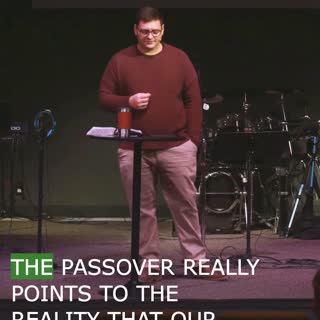Passover: A Foreshadowing of Christ's Redemption
Devotional
Sermon Summary
Bible Study Guide
Sermon Clips
"The Passover meal was meant to be a time to remember and to celebrate. To celebrate God's deliverance of the Israelites from slavery in Egypt. And Jesus breathes new life into this ancient celebration by putting himself and his imminent death on the cross at the climax of this meal." [00:46:50] (22 seconds)
"Through the lamb, God rescues the Israelites from slavery to Pharaoh in Egypt. But through Jesus, God rescues the world from slavery to sin and death." [00:47:36] (15 seconds)
"The cup that Jesus takes and says, take and drink, this is the cup of the new covenant, is the third cup. The cup of redemption, the cup after the meal, is the cup that Jesus takes and says, listen, I know that you know that this cup is for the blood of the lamb." [00:51:50] (23 seconds)
"He's the one who will pour out his blood for freedom from sin and death. And he has done so. Jesus went from this Passover meal with his disciples to being arrested, tried, and crucified for the sins of the world." [00:53:32] (16 seconds)
"It's not because what we've done or what we haven't done to be saved, but it's because the blood of the lamb of God atones for us." [00:54:03] (11 seconds)
"Believe that you are a new creation in Christ Jesus, that the old has gone, the new has come. You are adopted son or daughter of the most high God, the King of heaven." [00:55:06] (13 seconds)
"Jesus truly is our Passover lamb. And one day when we stand before God and we have to give an account of our lives, we can point to Jesus and say, I believe. I didn't do it." [00:56:46] (17 seconds)
"The Passover really points to the reality that our past and our present self is not what God is looking at. Hear that. Our past and our present selves is not what God is looking at." [00:58:36] (20 seconds)
"We can look at Jesus and what he's done on our behalf and say yes and amen, I believe. I believe and I hope, I hope that that brings you freedom." [00:59:14] (18 seconds)


















